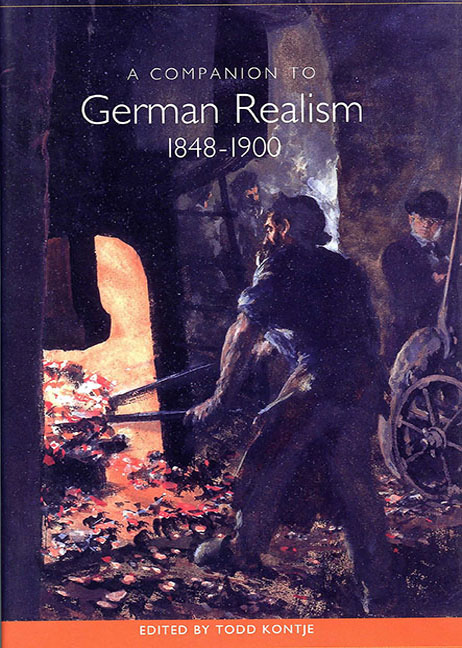Book contents
- Frontmatter
- Contents
- Preface
- Introduction: Reawakening German Realism
- Adalbert Stifter's Brigitta, or the Lesson of Realism
- Mühlbach, Ranke, and the Truth of Historical Fiction
- “In the Heart of the Heart of the Country”: Regional Histories as National History in Gustav Freytag's Die Ahnen (1872–80)
- A Woman's Post: Gender and Nation in Historical Fiction by Louise von François
- Friedrich Spielhagen: The Demon of Theory and the Decline of Reputation
- Wilhelm Raabe and the German Colonial Experience
- From National Task to Individual Pursuit: The Poetics of Work in Freytag, Stifter, and Raabe
- Das Republikanische, das Demokratische, das Pantheistische: Jewish Identity in Berthold Auerbach's Novels
- E. Marlitt: Narratives of Virtuous Desire
- The Appeal of Karl May in the Wilhelmine Empire: Emigration, Modernization, and the Need for Heroes
- Making Way for the Third Sex: Liberal and Antiliberal Impulses in Mann's Portrayal of Male-Male Desire in His Early Short Fiction
- Effi Briest and the End of Realism
- Works Cited
- Notes on the Contributors
- Index
From National Task to Individual Pursuit: The Poetics of Work in Freytag, Stifter, and Raabe
Published online by Cambridge University Press: 27 April 2017
- Frontmatter
- Contents
- Preface
- Introduction: Reawakening German Realism
- Adalbert Stifter's Brigitta, or the Lesson of Realism
- Mühlbach, Ranke, and the Truth of Historical Fiction
- “In the Heart of the Heart of the Country”: Regional Histories as National History in Gustav Freytag's Die Ahnen (1872–80)
- A Woman's Post: Gender and Nation in Historical Fiction by Louise von François
- Friedrich Spielhagen: The Demon of Theory and the Decline of Reputation
- Wilhelm Raabe and the German Colonial Experience
- From National Task to Individual Pursuit: The Poetics of Work in Freytag, Stifter, and Raabe
- Das Republikanische, das Demokratische, das Pantheistische: Jewish Identity in Berthold Auerbach's Novels
- E. Marlitt: Narratives of Virtuous Desire
- The Appeal of Karl May in the Wilhelmine Empire: Emigration, Modernization, and the Need for Heroes
- Making Way for the Third Sex: Liberal and Antiliberal Impulses in Mann's Portrayal of Male-Male Desire in His Early Short Fiction
- Effi Briest and the End of Realism
- Works Cited
- Notes on the Contributors
- Index
Summary
In Fiction — in literature as well as in film — work is not usually the central issue. On the contrary: the main characters of most more or less plausibly realistic fictional narratives are provided at the outset with some means, however sketchy, of supporting themselves so that the story can focus on something else that is presumably more interesting: a love story, a passion, a crime, a mystery, self-realization, personal growth, psychological development, etc. The (semi-) literary depiction of work is usually relegated to “engaged writing,” pamphlets, political tracts, propaganda, Arbeiterliteratur, documentaries, diaries, and so forth. This well-established generic division reflects a fundamental perception of work as something necessary but rarely pleasurable, a chore whose rewards — a salary — allow us to be and to do what we would rather do if we had our choice. Work, in short, is the mundane base onto which we build our superstructures of personal growth, leisure, fun, and pleasure.
The backgrounding of work even in so-called realist novels — often qualified as “bourgeois” or “poetic” in the German nineteenth-century context — provides the starting point for the present inquiry into aspects of the vast and multifaceted realm of work. The essay poses a simple question: how is work, labor, one's professional occupation, one's ways of earning a livelihood depicted in three representative nineteenth-century German novels? This is not the same, of course, as asking what role work plays in nineteenth-century German society and economy or what role it plays for specific groups of people — the declining nobility, the rising bourgeoisie, peasants moving into cities as workers, the industrialists and entrepreneurs, the emerging management class, or the political and social theorists — although the views of all of these groups would no doubt warrant their own inquiries.
In this study work is framed primarily in the context of a literary inquiry, with reference to extraliterary aspects when necessary. Discourse boundaries are blurry at best. The genre of the realist novel in particular, with its implied theoretical claim to providing plausible extensions of reality into the literary realm, is program-matically linked to extraliterary social, political, and other issues.
- Type
- Chapter
- Information
- A Companion to German Realism 1848-1900 , pp. 183 - 222Publisher: Boydell & BrewerPrint publication year: 2002



